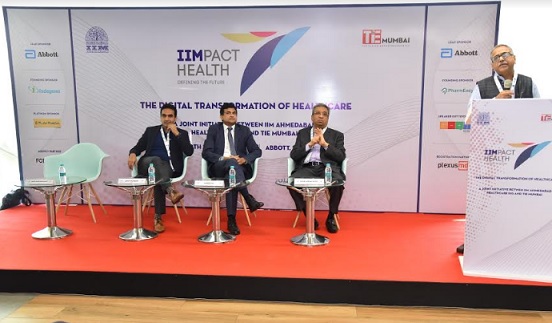Trending Now
- 830 voters names go missing in Kavundampalayam constituency
- If BJP comes to power we shall consider bringing back electoral bonds: Nirmala Sitaraman
- Monitoring at check posts between Kerala and TN intensified as bird flu gets virulent in Kerala
Post
TiE Mumbai and IIM Ahmedabad Alumni Healthcare SIG Organize IIMPACT Health Conference – The Digital Transformtion of Healthcare
![]() December 12, 2019
December 12, 2019
TiE Mumbai and IIM Ahmedabad Alumni Healthcare SIG organized a marquee healthcare conclave to promote, connect and foster the healthcare startup community among their peer large Healthcare Companies.
 |
L – R: Amit Mookim (TiE Mumbai) – Jawed Zia (Abbott) – Pankaj Patel (Zydus Cadila) – Rakesh Basant (IIMA) at the conference
Big Data, Analytics, Artificial Intelligence/Machine Learning, Wearables, mHealth, Robotics, use of Augmented Reality and 3D Printing are fundamentally transforming healthcare delivery to patients, medical research, access to healthcare, physician-physician interactions and improving efficiencies in the healthcare supply chain, among other things.
With the surge of the Healthcare Start-up ecosystem in India, there is a tremendous scope for innovative start-ups to make their presence felt. The Theme for IIMPACT Health’s very first conference was ‘The Digital Transformation of Healthcare’ and was well attended by some of the biggest names in Healthcare in India today. The purpose was to provide a platform where startups, established players, investors, academia and consultants could engage with each other, exchange ideas, debate them and network. There were interesting discussions on how technology could disrupt established healthcare businesses and scaling up healthcare startups. A couple of thought leaders presented their views on healthcare developments in the coming decade. Summing up the event, an economist opined that digital technologies were the only way to close the gap between healthcare supply and demand in India.
“India is seeing its own digital health revolution, be it the rapid growth of e-pharmacies, health wearables, use of AI to deliver treatment, clinic management via cloud-based platforms amongst others. This conference enables startups and large companies to come together and innovate towards building a digital health ecosystem,” said Atul Nishar, President, TiE Mumbai.
“The Healthcare Start-up ecosystem in India is booming, with a lot of innovative start-ups coming up to solve hereto unsolved problems,” said Sudarshan Jain, Charter Member, TiE Mumbai and IIM-A Alumnus.
“This is a transformational time in healthcare," said Jawed Zia, Head of Abbott’s pharmaceutical business in India. “The need for technology-based services that help people manage their health challenges has never been greater. Technology will influence the quality and efficiency of services for better patient outcomes across the continuum of care,” added Jawed Zia.
This one day conference was attended by over 350 delegates which included 80 startups, corporate executives, serial entrepreneurs & healthcare professionals, investors and IIM Professors.
About TiE Mumbai
The Indus Entrepreneurs (TiE), was founded in 1992 in Silicon Valley by a group of successful entrepreneurs, corporate executives, and senior professionals with roots in the Indus region. Since 1992. TiE has been supporting entrepreneurs by offering education, mentorship, networking and funding opportunities. The mission of TiE is to foster entrepreneurship globally through the 5 pillars of TiE: mentoring, networking and education, funding and incubation. Dedicated to the virtuous cycle of wealth creation and giving back to the community. TiE’s focus area is to generate enable the next generation of entrepreneurs. There are currently 11,000 members, including over 2,500 charter members in 60 chapters across 17 countries. TiE’s mission is to foster entrepreneurship globally through mentoring, networking, and education.
About IIM Ahmedabad Alumni SIG
The Indian Institute of Management (IIM) at Ahmedabad is India’s premier Management Institute. Considering the importance of Healthcare to society at large and the strategic issues faced by this sector, there is tremendous scope for solution generation and value creation. This led to the formation of the Healthcare Special Interest Group (SIG) in early 2019, facilitated by a core group consisting of eminent faculty members and alumni. The objective of this SIG is to provide thought leadership that can aid industry level strategy and policy formulation, provide a platform for industry-academia-government interaction, contribute to the start-up ecosystem and provide networking opportunities.


















